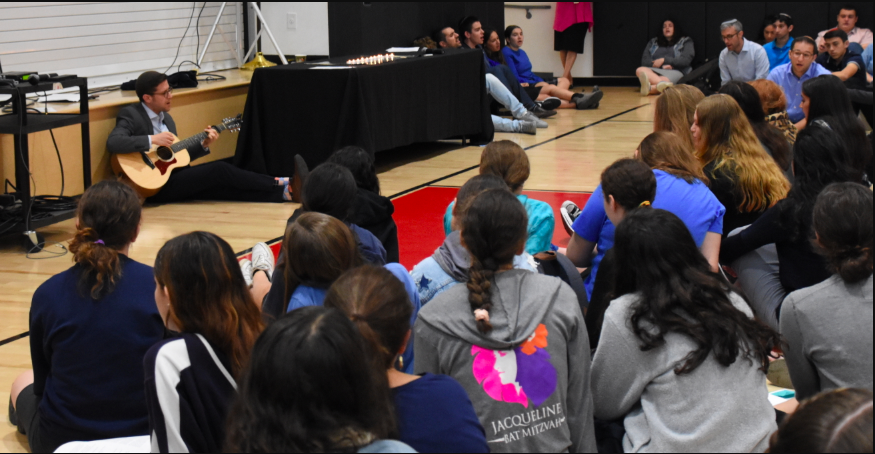Psalms and slow singing soften a day of broken hearts after Pittsburgh shooting
November 1, 2018
Everyone had heard about how they died on the news. But on Monday morning, the Shalhevet community took time to appreciate the victims of the mass synagogue shooting in Pittsburgh as kedoshim — holy ones.
Last Saturday, the Jewish world was shocked as word spread of the shooting at the Tree of Life synagogue in Pittsburgh. A citywide vigil was held Sunday night in Westwood, as in other cities around the U.S.
Monday was the first day back at school. Responding to the tragedy, first period classes were replaced by a schoolwide gathering in the gym at 8 a.m. Instead of sitting on chairs as at Town Hall, all 256 Shalhevet students sat on the floor to reflect and honor the 11 victims..
After starting off talkative, the tightly bunched-up crowd became almost silent as speeches began. Many students wore blue, “to honor the memory of the victims, and stand together in solidarity against anti-semitism,” as requested by senior Kira Faerstein of the fashion club on Schoology the night before.
The ceremony started with a speech by Yoetzet Atara Segal emphasising hatmadah, perseverance. Referring to news reports, she said that the victims were people who always came early to shul and were willing to help others, and that all members of the Shalhevet community should follow their example.
“Throughout the ceremony this morning,” Yoetzet Segal said, “as we reflect on what’s happening, let’s take into the rest of our days, let’s take into the rest of our lives this idea of constantly being there.”
Judaic Studies teacher Rabbi Abraham Lieberman spoke of the responsibility of everyone to improve the world.
“It starts literally b’einenu” — among ourselves — “how we deal with each other, how we deal with our family, how we deal with broken hearts and people who need help,” said Rabbi Lieberman.
As he was mentioning the connection between the week’s Torah portion — parshat Chayei Sarah, where Abraham buries Sarah — and the burial of the Saturday’s victims, he caught himself.
“We should try not to refer to them as victims,” said Rabbi Lieberman. “They’re kedoshim. They’re holy people. Any Jew no matter what stature… a Jew that is killed because they are a Jew, that is a kedosh.”
Rabbi David Stein led the group in the recitation of tehillim (psalms) 20, 121 and 130, and students looked down at the sheets of text noting each word.
Then Choirhawks gave a slow and restrained performance of Acheinu, which was followed by the whole room singing the song in unison.
Then, to honor each victim individually, juniors Gaby Lasry and Caroline Edry spoke the victims’ names as 11 students each lit a candle. The candles were moved into the foyer for the rest of the day for everyone to see.
Rabbi Block then led the room in a slow shira –slow songs sung in unison — beginning with a guitar-accompanied version of Matisyahu’s “One Day” — quite different from the rousing Koolulam version of the song which was sung on the roof last year with drums, guitars and the whole school singing harmony.
Instead, Rabbi Block sat on the floor like the students, and simply played his guitar. The room sang all the words, including verses that had been left out last spring:
It’s not about win or lose
We all lose when they feed on the souls of the innocent
Blood drenched pavement
Keep on moving though the waters stay raging
The next song was “Esa Einai” — “I’ll lift my eyes to the mountains.” With 11 candles flickering on the table behind them, it wasn’t quite as loud as the usual slow shira, either. But it evoked the sadness and anger of the day, as well as the desire to rise stronger from the latest tragedy.
